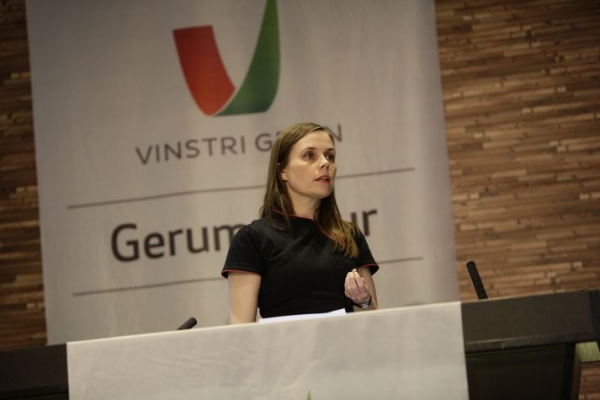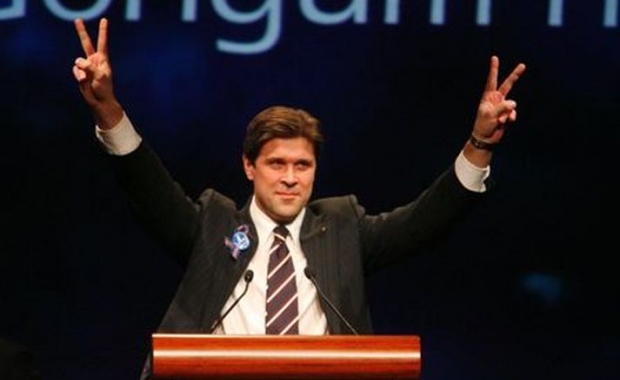The big story in Icelandic politics yesterday was the decision by the Reykjavík Sheriff's Department to issue a gag order on the local newspaper Stundin, barring it from covering leaked documents which outlined questionable and problematic financial transactions by the Prime Minister of Iceland, Bjarni Benediktsson, the chairman of the conservative Independence Party. The gag order and the questions raised by the coverage of Stundin have re-ignited a debate about the corrupting effects of wealth in politics and the value of a free press.
Read more: Report: Local newspaper issued gag order after covering shady business dealings of PM
The story of the financial dealings of Bjarni and his father and other family members in the lead up to the crash have not only been covered by local media. The UK newspaper the Guardian has covered the leak in detail, offering a first rate English language coverage of the leak and the problems it creates for the Prime Minister. However, the Reykjavík Sheriff‘s department has not requested a gag order on the coverage of the Guardian. This is all the more curious as the Guardian presumably has access to exactly the same documents as Stundin.
The Reykjavík Sheriff's Department has said it will refer the case to the prosecutor's office, requesting a criminal investigation of the document leak from the estate of failed bank Glitnir.
More revelations were on their way

The editor of Stundin, Jón Trausti Reynisson, told the local news site Vísir that the paper had several more stories based on leaked documents from the failed bank Glitnir which reveal previously unknown details about the financial dealings of the current Prime Minister of Iceland in the lead up to the collapse of the banks in October 2008. We had not finished covering this story, and we believe the coverage is of vital importance to the public, he told Vísir.
Jón Trausti said he believes that even if the gag order will ultimately be overturned by the courts, it means the paper will not be able to continue its coverage before the October 28 elections. Stundin and the investigative journalism company Reykjavík Media had acquired the documents before the elections were called and had been working on them for some time, but decided to run it's coverage earlier than initially planned to ensure the story was made public before the elections.
Civil Rights activists, legal experts as well as the attourney for Stundin say it is illegal to bar newspapers and media from covering issues which are vital and legitimate interest to the general public. Legal experts who spoke to the National Broadcasting Service say the gag order will not hold up in court.
Outrage on social media

The paper and it's editorial staff have seen an outpoaring of support since yesterday and a boom in subscriptions. Icelanders also took to social media to express their outrage at what is almost universally seen as an attack on the freedom of the press.
Many suggested the gag order had been ordered by Bjarni himself or the leadership of the Independence Party. Some pointed out that the head of the Reykjavík‘s sheriff‘s department is a long time Independence Party operative and stalwart. In 1998 he was accused of having engaged in election fraud in the municipal elections on behalf of the Independence Party.
Oversight committee to meet to discuss press freedom
After the news of the gag order broke yesterday the representatives of the Left Green Movement and the Pirate Party called for a meeting of the Parliamentary Oversight Commitee to discuss the issue.
The Icelandic National Broadcasting Service reports that the committee will meet tomorrow to discuss the question of press freedom and political attacks on the media.
A free press is crucial for democracy

Independence Party leaders were criticized for not responding to the news of the gag order when it was reported yesterday morning. Party leaders, including the chairman, waited until afternoon to comment, the Prime Minister not being available for comment all morning. The only public comment all morning came from a back-bench MP for the party claimed it was an attack on the chairman and the party.
By afternoon the party had come out condemning the ban, saying that a free press was crucial for a democratic society. The Prime Minister said that while he did not particularly like the coverage he understood that political figures had to tolerate all kinds of criticism and coverage. He has continued to maintain that the Glitnir-leak doesn't implicate him in any illegal financial transactions.
Stundin and it's editor have responded to the various statements from the Prime Minister, accusing him of misrepresenting the coverage of Stundin. Jón Trausti told the local news site Vísir that Bjarni has not responded to any of the actual allegations or answered any of the fundamental questions raised by the Glitnir-leak and the coverage of Stundin.
A shadowy conspiracy?

Far-right bloggers took a similar approach, suggesting the coverage of Stundin was part of a wider conspiracy which brought down the last Prime Minister, Sigmundur Davíð Gunnlaugsson, who resigned last year amidst the fallout from the Panama Papers. Sigmundur Davíð has maintained the media coverage of his appearance in the Panama Papers leak was orchestrated by his political enemies and global financial elites, including George Soros. The stories were fake news.
Read more: Interview with disgraced former PM over Panama Papers nominated for an Emmy award
This conspiracy theory was echoed in the editorial of the local newspaper Morgunblaðið. The editorial claims that Stundin and other news outlets who have covered the revalations in the Glitnir leak are political enemies of the Independence Party who are only out to attack the Prime Minister. The editor of Morgunblaðið is Davíð Oddsson, who was the chairman of the Independence Party 1991-2005, the Prime Minister of Iceland in 1991-2004 and the director of the Central Bank in 2005-2009. In 2008 Time Magazine named Davíð Oddsson one of the 25 People to Blame for the Financial Crisis.
The big story in Icelandic politics yesterday was the decision by the Reykjavík Sheriff's Department to issue a gag order on the local newspaper Stundin, barring it from covering leaked documents which outlined questionable and problematic financial transactions by the Prime Minister of Iceland, Bjarni Benediktsson, the chairman of the conservative Independence Party. The gag order and the questions raised by the coverage of Stundin have re-ignited a debate about the corrupting effects of wealth in politics and the value of a free press.
Read more: Report: Local newspaper issued gag order after covering shady business dealings of PM
The story of the financial dealings of Bjarni and his father and other family members in the lead up to the crash have not only been covered by local media. The UK newspaper the Guardian has covered the leak in detail, offering a first rate English language coverage of the leak and the problems it creates for the Prime Minister. However, the Reykjavík Sheriff‘s department has not requested a gag order on the coverage of the Guardian. This is all the more curious as the Guardian presumably has access to exactly the same documents as Stundin.
The Reykjavík Sheriff's Department has said it will refer the case to the prosecutor's office, requesting a criminal investigation of the document leak from the estate of failed bank Glitnir.
More revelations were on their way

The editor of Stundin, Jón Trausti Reynisson, told the local news site Vísir that the paper had several more stories based on leaked documents from the failed bank Glitnir which reveal previously unknown details about the financial dealings of the current Prime Minister of Iceland in the lead up to the collapse of the banks in October 2008. We had not finished covering this story, and we believe the coverage is of vital importance to the public, he told Vísir.
Jón Trausti said he believes that even if the gag order will ultimately be overturned by the courts, it means the paper will not be able to continue its coverage before the October 28 elections. Stundin and the investigative journalism company Reykjavík Media had acquired the documents before the elections were called and had been working on them for some time, but decided to run it's coverage earlier than initially planned to ensure the story was made public before the elections.
Civil Rights activists, legal experts as well as the attourney for Stundin say it is illegal to bar newspapers and media from covering issues which are vital and legitimate interest to the general public. Legal experts who spoke to the National Broadcasting Service say the gag order will not hold up in court.
Outrage on social media

The paper and it's editorial staff have seen an outpoaring of support since yesterday and a boom in subscriptions. Icelanders also took to social media to express their outrage at what is almost universally seen as an attack on the freedom of the press.
Many suggested the gag order had been ordered by Bjarni himself or the leadership of the Independence Party. Some pointed out that the head of the Reykjavík‘s sheriff‘s department is a long time Independence Party operative and stalwart. In 1998 he was accused of having engaged in election fraud in the municipal elections on behalf of the Independence Party.
Oversight committee to meet to discuss press freedom
After the news of the gag order broke yesterday the representatives of the Left Green Movement and the Pirate Party called for a meeting of the Parliamentary Oversight Commitee to discuss the issue.
The Icelandic National Broadcasting Service reports that the committee will meet tomorrow to discuss the question of press freedom and political attacks on the media.
A free press is crucial for democracy

Independence Party leaders were criticized for not responding to the news of the gag order when it was reported yesterday morning. Party leaders, including the chairman, waited until afternoon to comment, the Prime Minister not being available for comment all morning. The only public comment all morning came from a back-bench MP for the party claimed it was an attack on the chairman and the party.
By afternoon the party had come out condemning the ban, saying that a free press was crucial for a democratic society. The Prime Minister said that while he did not particularly like the coverage he understood that political figures had to tolerate all kinds of criticism and coverage. He has continued to maintain that the Glitnir-leak doesn't implicate him in any illegal financial transactions.
Stundin and it's editor have responded to the various statements from the Prime Minister, accusing him of misrepresenting the coverage of Stundin. Jón Trausti told the local news site Vísir that Bjarni has not responded to any of the actual allegations or answered any of the fundamental questions raised by the Glitnir-leak and the coverage of Stundin.
A shadowy conspiracy?

Far-right bloggers took a similar approach, suggesting the coverage of Stundin was part of a wider conspiracy which brought down the last Prime Minister, Sigmundur Davíð Gunnlaugsson, who resigned last year amidst the fallout from the Panama Papers. Sigmundur Davíð has maintained the media coverage of his appearance in the Panama Papers leak was orchestrated by his political enemies and global financial elites, including George Soros. The stories were fake news.
Read more: Interview with disgraced former PM over Panama Papers nominated for an Emmy award
This conspiracy theory was echoed in the editorial of the local newspaper Morgunblaðið. The editorial claims that Stundin and other news outlets who have covered the revalations in the Glitnir leak are political enemies of the Independence Party who are only out to attack the Prime Minister. The editor of Morgunblaðið is Davíð Oddsson, who was the chairman of the Independence Party 1991-2005, the Prime Minister of Iceland in 1991-2004 and the director of the Central Bank in 2005-2009. In 2008 Time Magazine named Davíð Oddsson one of the 25 People to Blame for the Financial Crisis.







